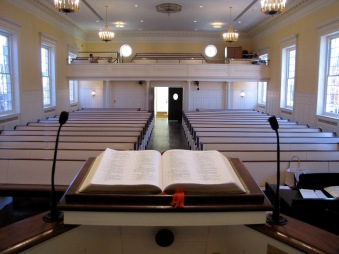 I’ll be preaching at church this Sunday, my second time since our pastor resigned a few months ago. It’s always tricky for me to speak in front of a congregation, partially because I spend so much time in front of a classroom, which has a very different dynamic. Another tricky aspect of preaching is that speaking to a church in transition can be awkward because you want to talk about the transition while also NOT wanting to talk about the transition.
I’ll be preaching at church this Sunday, my second time since our pastor resigned a few months ago. It’s always tricky for me to speak in front of a congregation, partially because I spend so much time in front of a classroom, which has a very different dynamic. Another tricky aspect of preaching is that speaking to a church in transition can be awkward because you want to talk about the transition while also NOT wanting to talk about the transition.
I found some real challenge and encouragement in this recent piece by Fleming Rutledge, a priest, author, and teacher in the Anglican tradition. The article, recently posted to Christianity Today, presents some strong words good to hear when stepping in for one Sunday here and there . . . or for preaching every week. She writes:
If the preacher is not personally invested in expounding the text, so that he or she seems to be risking something, it’s not biblical preaching. If the sermon does not seem to be coming out of the preacher’s inmost convictions, it’s not biblical preaching. If the preacher is not preaching as George Whitfield did, “a dying man to dying men,” it’s not biblical preaching.
It is all too easy to not invest yourself personally in the text and what is being preached. It is easy to forget that “you are dying,” even though you might feel that way the whole week prior to stepping into the pulpit. Rutledge continues:
The preacher should be changed by his preaching in some way, every time. If the text is really having its way with you, you will know it, and those who have ears to hear will know it. If you know you are dying, you will know the word of life when you hear it, and it will not be something plucked out of an online homiletical resource. It will be wrenched out of your gut by something—Someone—whose power issues forth from the same living Word that brought the creation into being out of nothing—ex nihilo.
It can be difficult to let on that “you’re dying” when speaking before others. Perhaps that is one of the greater challenges of the pulpit: to live and die simultaneously. Something to think about, particularly as that ties into my passage for this Sunday: 2 Corinthians 4. Maybe I’ll even find a way to work Rutledge’s thoughts into my sermon, almost as a way of feeling a little less alone in front of the congregation.
(image from cribbsification.com)





